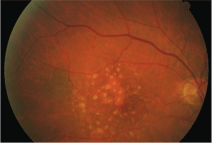 Age-related macular degeneration (AMD) is a complex, multifactorial disease with a poorly understood underlying etiology. Several specific risk factors, such as age, smoking and family history, have been positively identified.
Age-related macular degeneration (AMD) is a complex, multifactorial disease with a poorly understood underlying etiology. Several specific risk factors, such as age, smoking and family history, have been positively identified.
The discovery of genetic and environmental risk factors for AMD has promoted a greater understanding of the disease.1,2
Of particular importance: Several recent stuides have demonstrated a direct association between a variant of the complement factor H (CFH) gene and an increased risk for AMD development.3,4
A Genetic Link
Several studies provide evidence that particular families are genetically predisposed to AMD.5-7 And, in these groups, prevalence of AMD increases two to four times among first-degree family members, such as siblings.6-8
More recently, researchers have identified various polymorphisms (DNA sequence alterations) in CFH genes that are associated with AMD development.2,9 In 2005, one study determined that a variant in the CFH gene was linked to a predisposition for AMD.3 Homozygous individuals demonstrated a risk nearly seven times higher for AMD, while heterozygous individuals were two to four times more likely to develop AMD.3,4,9,10 The CFH gene variant may account for approximately 50% of all AMD cases.3

Research has shown an association between a variant of the complement factor H (CFH) gene and an increased risk of developing AMD, as seen in this patient.
CFH and AMD
The CFH gene is located on chromosome 1. This gene encodes for a unique protein in the alternative pathway of the complement cascade that regulates inflammation and plays a role in modulating disease.11
The CFH gene variant causes a single amino acid substitution between tyrosine and histidine.12 As a result, the protein encoded by the CFH gene variant fails to properly regulate inflammation, resulting in tissue damage.
With respect to the eye, the impaired downregulation of the alternative complement cascade at the level of Bruchs membrane and the retinal pigment epithelium may result in persistent inflammation and subsequent drusen formation.13,14
CFH has also been associated with increased production of vascular endothelial growth factor (VEGF), which may result in AMD progression.14 A retrospective study concluded that patients with the CFH variant genotype demonstrated a worse prognostic response following intravitreal bevacizumab treatment compared to those without the gene variant; this finding was primarily attributed to a larger choroidal neovascular membrane formation.15
Conventional therapy for AMD includes dietary and nutritional supplements. Michael L. Klein, M.D., and associates concluded that, when taking supplements with the AREDS (Age Related Eye Disease Study) formula, an individuals response may be related to his or her particular genotype.16 In this study, subjects who had the low-risk genotype experienced an overall reduction of AMD progression by 68%, compared to an 11% reduction among subjects who had the high-risk genotype. These results suggest that the CFH variant gene limits the benefits of dietary and nutritional supplements in some AMD patients.
Both genetic and environmental factors play a role in AMD development. Genetics alone is not definitive for the prevalence or progression of the disease. Patients with known high-risk genotypes may not develop AMD, yet by assessing the interaction between genetics and environmental triggers, we may be able to identify at-risk patients and potentially predict disease outcomes.17
Future genetic research of AMD may allow for risk assessment of patients who might benefit from closer monitoring and/or earlier treatment. Genetic studies will help us further understand the pathophysiology of this complex disease, which will facilitate its future management.
1. Seddon JM, George S, Rosner B, Klein ML. CFH gene variant, Y402H, and smoking, body mass index, environmental associations with advanced age-related macular degeneration. Hum Hered 2006;61(3):157-65.
2. Schmidt S, Hauser MA, Scott WK, et al. Cigarette smoking strongly modifies the association of LOC387715 and age-related macular degeneration. Am J Hum Genet 2006 May;78(5):852-64.
3. Klein RJ, Zeiss C, Chew EY, et al. Complement factor H polymorphism in age-related macular degeneration. Science 2005 Apr 15;308(5720):385-9.
4. Haines JL, Hauser MA, Schmidt S, et al. Complement factor H variant increases the risk of age-related macular degeneration. Science 2005 Apr 15;308(5720):419-21.
5. Seddon JM,
6. Seddon JM, Ajani UA, Mitchell BD. Familial aggregation of age-related maculopathy. Am J Ophthalmol 1997 Feb;123(2): 199-206.
7. Silvestri G, Johnston PB, Hughes AE. Is genetic predisposition an important risk factor in age-related macular degeneration? Eye 1994;8(Pt 5):564-8.
8. Klaver CC, Wolfs RC, Assink JJ, et al. Genetic risk of age-related maculopathy. Population-based familial aggregation study. Arch Ophthalmol 1998 Dec;116(12):1646-51.
9. Seddon J, Francis P, George S, et al. Association of CFH Y402H and LOC387715 A69S with progression of age-related macular degeneration. JAMA 2007 Apr 25;297(16):1793-800.
10. Edwards AO, Ritter R, Abel KJ, et al. Complement factor H polymorphism and age-related macular degeneration. Science 2005 Apr 15;308(5720):421-4.
11. Hageman GS, Anderson DH, Johnson
12. Day AJ, Willis AC, Ripoche J, Sim RB. Sequence polymorphism of human complement factor H. Immunogenetics 1988;27(3):211-4.
13. Johnson
14. Nozaki M, Raisler BJ, Sakurai E, et al. Drusen complement components C3a and C5a promote choroidal neovascularization. Proc Natl Acad Sci U S A 2006 Feb 14;103(7):2328-33.
15. Bratley MA, Fang AM, King JM, et al. Association of complement factor H and LOC387715 genotypes with response of exudative age-related macular degeneration to intravitreal bevacizumab. Ophthalmology 2007 Dec;114(12):2168-73.
16. Klein ML, Francis PJ, Rosner B, et al. CFH and LOC387715/ARMS2 genotypes and treatment with antioxidants and zinc for age-related macular degeneration. Ophthalmology 2008 Jun;115(6):1019-25.
17. Hughes AE, Orr N, Patterson C, et al. Neovascular age-related macular degeneration risk based on CFH, LOC387715/ HTRA1, and smoking. PLoS Med 2007 Dec;4(12):e355.











